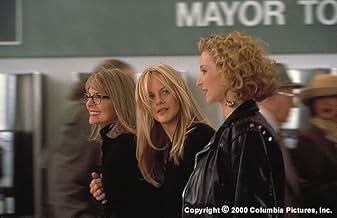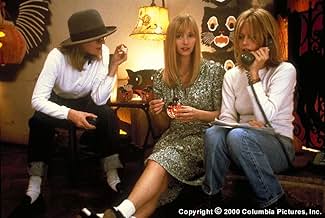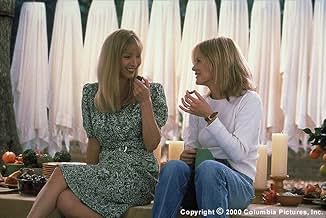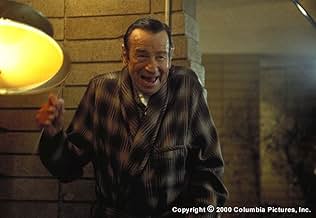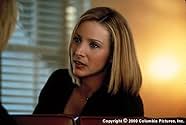AVALIAÇÃO DA IMDb
4,9/10
13 mil
SUA AVALIAÇÃO
Um trio de irmãs se une sobre sua ambivalência em relação à morte iminente de seu pai intolerante, a quem nenhuma delas era particularmente próxima.Um trio de irmãs se une sobre sua ambivalência em relação à morte iminente de seu pai intolerante, a quem nenhuma delas era particularmente próxima.Um trio de irmãs se une sobre sua ambivalência em relação à morte iminente de seu pai intolerante, a quem nenhuma delas era particularmente próxima.
- Prêmios
- 2 vitórias e 1 indicação no total
Shaun Duke
- Omar Kunundar
- (as Duke Moosekian)
Elizabeth Hudson
- Georgia's Assistant
- (as Libby Hudson)
Avaliações em destaque
Telemarketer irritation--that's the feeling I had when I watched Hanging Up, an almost cartoonishly clichéd "woman's movie." Diane Keaton's direction of this mess is so incompetent that I hope she never stands behind a camera again. The movie fails on every level--it bored my wife and daughter (and it's only because I'm anal about finishing movies that I sat through 95 minutes of Hell; they went to bed).
This was Walter Matthau's last movie, and it hurts to see such a premiere talent being wasted (although his toupee looks as if it could live on). Meg Ryan appears to have lost weight for Hanging Up (if that's possible) and seems to be carrying the mass of the world on her shoulders, physically dissipating in front of our eyes while wearing one paper-thin muscle shirt after another. Looking scrawny and bra-less isn't appealing to anyone.
Okay, enough for the nastiness. This really is a waste of film stock. Whatever BIG messages it has about sibling rivalry and familial relationships and keeping your accident from your insurance company are lost in Keaton's attempt to play cute and/or sweet (the dog and the pill; the Iranian mom).
The movie's called Hanging Up. My suggestion is to take the phone off the hook before the opening credits.
This was Walter Matthau's last movie, and it hurts to see such a premiere talent being wasted (although his toupee looks as if it could live on). Meg Ryan appears to have lost weight for Hanging Up (if that's possible) and seems to be carrying the mass of the world on her shoulders, physically dissipating in front of our eyes while wearing one paper-thin muscle shirt after another. Looking scrawny and bra-less isn't appealing to anyone.
Okay, enough for the nastiness. This really is a waste of film stock. Whatever BIG messages it has about sibling rivalry and familial relationships and keeping your accident from your insurance company are lost in Keaton's attempt to play cute and/or sweet (the dog and the pill; the Iranian mom).
The movie's called Hanging Up. My suggestion is to take the phone off the hook before the opening credits.
I saw this movie because of the stars. I love Keaton, Ryan and Kudrow. As the "story" unfolded before my eyes, and what I saw was horrible. Plan and simple.
I can not believe that Diane Keaton, one to the best comedic actresses around would let herself make two of her worst films,
(Hanging Up and Town & Country)
right after two of her funniest films
(The First Wives Club and Father of the Bride 1&2).
Is she trying to end her career?? And picking this to direct?? I don't see ANY directing going on here. Maybe if there were it wouldn't have been a MAJOR waste of my time and money.
Do not watch this unless you are under heavy medication.
I can not believe that Diane Keaton, one to the best comedic actresses around would let herself make two of her worst films,
(Hanging Up and Town & Country)
right after two of her funniest films
(The First Wives Club and Father of the Bride 1&2).
Is she trying to end her career?? And picking this to direct?? I don't see ANY directing going on here. Maybe if there were it wouldn't have been a MAJOR waste of my time and money.
Do not watch this unless you are under heavy medication.
The late Walter Matthau ended his long and illustrious career as a film actor in `Hanging Up,' playing, appropriately, the dying father of three adult daughters. I wish I could say that the vehicle he chose as his eventual swan song were one truly worthy of his enormous skill and talent. Unfortunately or rather fortunately however, this will not be the film for which he is most remembered.
Like so many films, `Hanging Up' starts off with the most noble of intentions. Writer Delia Ephron and director Diane Keaton have attempted to come to terms with the most complex issue facing the aging baby boomer generation: how does one cope with ailing, aging and dying parents while trying to keep a grip on one's own hectic life and personal commitments? And, to make matters more complicated, how does one expend the physical and emotional energy needed for such a task when the parent himself is often irascible, crusty and even downright unlikable in his behavior and nature? And, finally, how does a wounded child ultimately find it in his or her heart to forgive the parent and arrive at that moment of reconciliation so crucial when death finally comes?
When `Hanging Up' focuses on this theme, it achieves moments of point and relevance. All of us can identify with the main character, Eve (Meg Ryan), a sweet, warmhearted young woman who, alone of the three daughters, has unflaggingly dedicated herself to the care of a father who, more often than not, strikes out at her in unappreciative scorn and anger. Wearied and harassed by the enormous burdens of her hectic life and her own inability to say `no' to the people who demand so much from her, Eve emerges as a truly winning and believable character. Unfortunately, her two sisters, Georgia (Diane Keaton), a magazine magnate, and Maddy (Lisa Kudrow), a soap opera actress, come across as shallow, two-dimensional characters whose self-absorption and seeming indifference are (ho hum) really masks for the insecurity and hurt hidden deep beneath their composed surfaces.
Somehow, however, for all its attempts to deal with a truly universal theme, `Hanging Up' never seems quite real in its look and demeanor it always feels like a movie. Maybe it is the overall slickness of the approach that undermines the seriousness of the drama. The actresses, good though they are, seem somehow too glamorous, their careers too unrepresentative of most of the people in the audience. Another problem is that the film can never seem to settle on an appropriate tone. One moment we find ourselves steeped in searing drama followed the next by a scene of trivial slapstick. Time and again, Ryan is forced to trip over a discarded toy, tangle with an overgrown mutt or bang away at an uncooperative coffee dispenser. Such incidents end up reducing the level of the drama to little more than sitcom status.
`Hanging Up' has, however, been blessed with a wonderful cast. Ryan, Keaton, Kudrow and Matthau pore on the charm and play off each other nicely. (And the film has some devilish fun playing up the physical similarities between Matthau and Richard Nixon). These fine performers obviously had a terrific time making the film together. That is why one regrets the fact, that for all their hard work, the film they left behind is so lacking in credibility and grit. At the end of his career and life, Matthau deserved better.
Like so many films, `Hanging Up' starts off with the most noble of intentions. Writer Delia Ephron and director Diane Keaton have attempted to come to terms with the most complex issue facing the aging baby boomer generation: how does one cope with ailing, aging and dying parents while trying to keep a grip on one's own hectic life and personal commitments? And, to make matters more complicated, how does one expend the physical and emotional energy needed for such a task when the parent himself is often irascible, crusty and even downright unlikable in his behavior and nature? And, finally, how does a wounded child ultimately find it in his or her heart to forgive the parent and arrive at that moment of reconciliation so crucial when death finally comes?
When `Hanging Up' focuses on this theme, it achieves moments of point and relevance. All of us can identify with the main character, Eve (Meg Ryan), a sweet, warmhearted young woman who, alone of the three daughters, has unflaggingly dedicated herself to the care of a father who, more often than not, strikes out at her in unappreciative scorn and anger. Wearied and harassed by the enormous burdens of her hectic life and her own inability to say `no' to the people who demand so much from her, Eve emerges as a truly winning and believable character. Unfortunately, her two sisters, Georgia (Diane Keaton), a magazine magnate, and Maddy (Lisa Kudrow), a soap opera actress, come across as shallow, two-dimensional characters whose self-absorption and seeming indifference are (ho hum) really masks for the insecurity and hurt hidden deep beneath their composed surfaces.
Somehow, however, for all its attempts to deal with a truly universal theme, `Hanging Up' never seems quite real in its look and demeanor it always feels like a movie. Maybe it is the overall slickness of the approach that undermines the seriousness of the drama. The actresses, good though they are, seem somehow too glamorous, their careers too unrepresentative of most of the people in the audience. Another problem is that the film can never seem to settle on an appropriate tone. One moment we find ourselves steeped in searing drama followed the next by a scene of trivial slapstick. Time and again, Ryan is forced to trip over a discarded toy, tangle with an overgrown mutt or bang away at an uncooperative coffee dispenser. Such incidents end up reducing the level of the drama to little more than sitcom status.
`Hanging Up' has, however, been blessed with a wonderful cast. Ryan, Keaton, Kudrow and Matthau pore on the charm and play off each other nicely. (And the film has some devilish fun playing up the physical similarities between Matthau and Richard Nixon). These fine performers obviously had a terrific time making the film together. That is why one regrets the fact, that for all their hard work, the film they left behind is so lacking in credibility and grit. At the end of his career and life, Matthau deserved better.
I rented this movie (`Hanging Up') and I found it devastatingly effective.
At the center of the movie is Meg Ryan, whose movies I've not seen a lot. Her character, Eve, is really the fulcrum on which the whole movie balances. Much as her character's car is boxed in by a parking-garage accident early in the movie, I got the feeling that the movie was a meditation on whether her life is of her own choosing and making, or whether it is something she has largely been trapped into.
Part of the art of the movie is, I feel, that the character doesn't really know. This isn't made explicit in dialogue - rather, you can see it in her face as she repeatedly goes through situations in her life. And in her reactions to those situations, you can see the many little waves of emotion sweeping over her, all vying for the upper hand. It's as if she's perpetually trying to find her place and regain her balance.
And this may be what some people who saw the movie and didn't like it don't see: at times, you wonder if she's really going to crack. An example is the brilliantly conceived set of characters represented by Eve's mother (in a brief appearance by Cloris Leachman) and Eve's husband (who has slightly more screen time). Each very clearly rejects Eve's father. But, in doing so, each of them places, perhaps unwittingly, a huge demand on her. For Eve, to live in the world that is dictated by others' expectations and reactions, whether reasonable or unreasonable, is to deny herself. And yet, the paradox is that, while her continued interactions with her father and sisters represent a possibly destructive degree of self-denial, in all the caring she dispenses to others, she is her best self. Her use of the phone is the clear metaphor for that she can't stand to stay on it, and yet she can't stand to stay off of it.
Diane Keaton's direction is very impressive in the movie, in my opinion. The staging and editing are first rate, and really frame the story beautifully. Her acting performance in the film is a little awkward, but her ability as a director to really get the actors to play with a subtlety and spontaneity in their reactions to each other (particularly in scenes between Meg Ryan and Lisa Kudrow) is very skilled.
I think that if a viewer sees the movie as just a light comedy or a succession of gags, they have really missed the point of what Diane Keaton is trying to do. I find that hard to fathom, because Meg Ryan's central performance clearly is meant to showcase the character's essential emotional confusion, and I feel like the direction emphasizes this repeatedly. Maybe some viewers are distracted by Meg Ryan's beauty, which may have had the effect of setting up some distance between themselves and the character. It could be argued that Keaton allowed Ryan to be so well dressed, often in extremely flattering outfits of pastel colors, that it's hard to take seriously that the character could be an emotional mess. Eve may have inadvertently been robbed of some of the character's gravitas as a result.
I see a lot of darkness in Walter Matthau's character as well, but the affection between him and the Meg Ryan character is also very clear. Adam Arkin contributes a fine supporting performance in the movie as Eve's husband. His character could have easily been so blandly cast that it would have sunk right into the background, but he is a confrontational, yet gentle, force in Eve's life, and helps call the question as to whether Eve's life is in the state it's in by her own choice or not.
So, to sum up, I think that to dismiss `Hanging Up' as a heartwarming bauble is to miss a lot. The central character is a woman that is pulled and tugged in so many directions, all in the midst of a life that looks deceptively normal given her stresses, but is really one that remains hers to define. By the end of the movie, you can see in Ryan's expressions (and judge for yourself) the degree to which she has, or has not, come to a level of acceptance about her lot.
At the center of the movie is Meg Ryan, whose movies I've not seen a lot. Her character, Eve, is really the fulcrum on which the whole movie balances. Much as her character's car is boxed in by a parking-garage accident early in the movie, I got the feeling that the movie was a meditation on whether her life is of her own choosing and making, or whether it is something she has largely been trapped into.
Part of the art of the movie is, I feel, that the character doesn't really know. This isn't made explicit in dialogue - rather, you can see it in her face as she repeatedly goes through situations in her life. And in her reactions to those situations, you can see the many little waves of emotion sweeping over her, all vying for the upper hand. It's as if she's perpetually trying to find her place and regain her balance.
And this may be what some people who saw the movie and didn't like it don't see: at times, you wonder if she's really going to crack. An example is the brilliantly conceived set of characters represented by Eve's mother (in a brief appearance by Cloris Leachman) and Eve's husband (who has slightly more screen time). Each very clearly rejects Eve's father. But, in doing so, each of them places, perhaps unwittingly, a huge demand on her. For Eve, to live in the world that is dictated by others' expectations and reactions, whether reasonable or unreasonable, is to deny herself. And yet, the paradox is that, while her continued interactions with her father and sisters represent a possibly destructive degree of self-denial, in all the caring she dispenses to others, she is her best self. Her use of the phone is the clear metaphor for that she can't stand to stay on it, and yet she can't stand to stay off of it.
Diane Keaton's direction is very impressive in the movie, in my opinion. The staging and editing are first rate, and really frame the story beautifully. Her acting performance in the film is a little awkward, but her ability as a director to really get the actors to play with a subtlety and spontaneity in their reactions to each other (particularly in scenes between Meg Ryan and Lisa Kudrow) is very skilled.
I think that if a viewer sees the movie as just a light comedy or a succession of gags, they have really missed the point of what Diane Keaton is trying to do. I find that hard to fathom, because Meg Ryan's central performance clearly is meant to showcase the character's essential emotional confusion, and I feel like the direction emphasizes this repeatedly. Maybe some viewers are distracted by Meg Ryan's beauty, which may have had the effect of setting up some distance between themselves and the character. It could be argued that Keaton allowed Ryan to be so well dressed, often in extremely flattering outfits of pastel colors, that it's hard to take seriously that the character could be an emotional mess. Eve may have inadvertently been robbed of some of the character's gravitas as a result.
I see a lot of darkness in Walter Matthau's character as well, but the affection between him and the Meg Ryan character is also very clear. Adam Arkin contributes a fine supporting performance in the movie as Eve's husband. His character could have easily been so blandly cast that it would have sunk right into the background, but he is a confrontational, yet gentle, force in Eve's life, and helps call the question as to whether Eve's life is in the state it's in by her own choice or not.
So, to sum up, I think that to dismiss `Hanging Up' as a heartwarming bauble is to miss a lot. The central character is a woman that is pulled and tugged in so many directions, all in the midst of a life that looks deceptively normal given her stresses, but is really one that remains hers to define. By the end of the movie, you can see in Ryan's expressions (and judge for yourself) the degree to which she has, or has not, come to a level of acceptance about her lot.
Some very good performances help this otherwise forgettable film about the relationship between the three daughters (played by Diane Keaton, Meg Ryan and Lisa Kudrow), of a dying man (Walter Matthau.) There isn't anything particularly noteworthy about the story itself. Told largely in flashback style, we see how the father-daughter relationship evolved over the years from a happy, loving one through the breakup of the parents and into the last days before Lou's death. The movie features fairly typical scenarios of the types of things that might cause family breakdowns (divorce, alcoholism, sibling rivalry, etc.) There are some humourous moments, but all in all I found myself largely disappointed by the story.
As I mentioned, though, there were some good performances which lifted this from a bad one to the ranks of mediocre to average. Meg Ryan was particularly good as Eve, the daughter who bears most of the responsibility for caring for Lou. She's guilty of a bit of overacting at times, but is definitely worthy of the leading role. Walter Matthau played Lou very well - but, of course, he should have been accustomed to playing crotchety old men by that point in his career. There were some surprise performances as well. Lisa Kudrow demonstrated more acting ability than I expected from her based on having watched "Friends" a few times, and, in a very limited role, Duke Moosekian was really quite funny as Dr. Omar Kunundar, whose car Eve manages to damage in a car accident. On the negative side, I was also surprised by what I thought was a very below average performance by Diane Keaton (who also directed, and who, in my opinion, showed no great talent as a director.) She simply began to grate after a while.
The best word I can come up with to describe this movie is bittersweet, both in the story of how a seemingly happy family turned out to be so consumed in anger and jealousy, and in the sense that the movie had possibilities, particularly in the strong performances I mentioned, that just didn't seem to add up to anything. Generously, I rated this as a 5/10.
As I mentioned, though, there were some good performances which lifted this from a bad one to the ranks of mediocre to average. Meg Ryan was particularly good as Eve, the daughter who bears most of the responsibility for caring for Lou. She's guilty of a bit of overacting at times, but is definitely worthy of the leading role. Walter Matthau played Lou very well - but, of course, he should have been accustomed to playing crotchety old men by that point in his career. There were some surprise performances as well. Lisa Kudrow demonstrated more acting ability than I expected from her based on having watched "Friends" a few times, and, in a very limited role, Duke Moosekian was really quite funny as Dr. Omar Kunundar, whose car Eve manages to damage in a car accident. On the negative side, I was also surprised by what I thought was a very below average performance by Diane Keaton (who also directed, and who, in my opinion, showed no great talent as a director.) She simply began to grate after a while.
The best word I can come up with to describe this movie is bittersweet, both in the story of how a seemingly happy family turned out to be so consumed in anger and jealousy, and in the sense that the movie had possibilities, particularly in the strong performances I mentioned, that just didn't seem to add up to anything. Generously, I rated this as a 5/10.
Você sabia?
- CuriosidadesWalter Matthau's final role. In very poor health throughout filming, he suffered from several cardiovascular problems, and had more than two heart attacks since his first in 1965. He died over seven months later, four months after the film's release.
- Erros de gravaçãoThere is no second floor to the Richard M. Nixon Library in Yorba Linda, California.
- Citações
Lou Mozell: You know, that I actually met a girl by the name of Moo Goo Gai Pan? That was her last name. Her first name was Freida. Freida Moo Goo Gai Pan. She was half-Jewish, half-Chinese. A lot of people called her the Ori-Yenta.
- Versões alternativasA flashback scene set in a New York City Chinese restaurant in the early 1990s where the sisters have a dinner with their father that ends in disaster was filmed, but ultimately cut from the final film.
- Trilhas sonorasOnce Upon A Time
Music by Charles Strouse
Lyrics by Lee Adams
Performed by Jay McShann
Courtesy of Sackville Records
Principais escolhas
Faça login para avaliar e ver a lista de recomendações personalizadas
Detalhes
- Data de lançamento
- Países de origem
- Idioma
- Também conhecido como
- Hanging Up
- Locações de filme
- Empresas de produção
- Consulte mais créditos da empresa na IMDbPro
Bilheteria
- Orçamento
- US$ 60.000.000 (estimativa)
- Faturamento bruto nos EUA e Canadá
- US$ 36.050.230
- Fim de semana de estreia nos EUA e Canadá
- US$ 13.567.978
- 20 de fev. de 2000
- Faturamento bruto mundial
- US$ 51.880.044
- Tempo de duração1 hora 34 minutos
- Cor
- Mixagem de som
- Proporção
- 1.85 : 1
Contribua para esta página
Sugerir uma alteração ou adicionar conteúdo ausente

Principal brecha
By what name was Linhas Cruzadas (2000) officially released in India in English?
Responda

